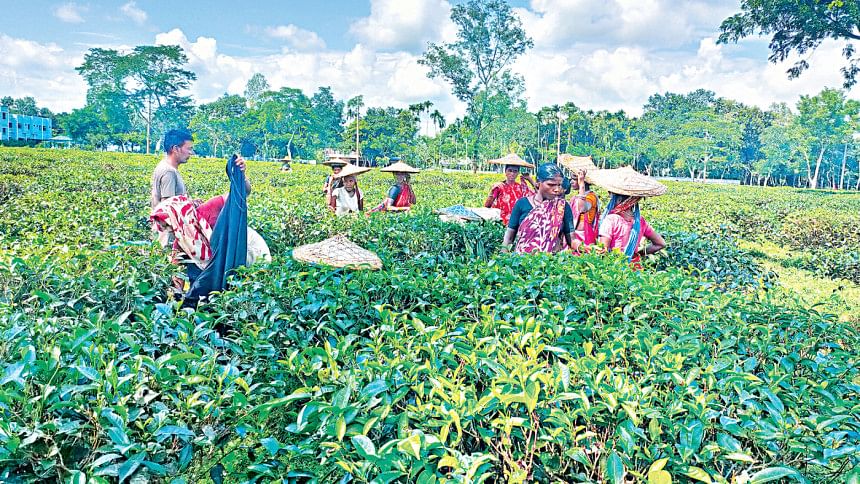Tea production to rise this year

The local tea industry was in hot water not long ago as various restrictions put in place all over the world amidst the ongoing coronavirus pandemic had led to a decrease in demand.
But as the situation slowly improves, tea production is back at full steam thanks to the revival of both foreign and domestic consumption.
If production continues at its present rate due to favourable weather conditions this year, yields will be better than that of the previous season, according to industry insiders.
Jahar Tarafder, member secretary of the Tea Planters and Traders Association of Bangladesh, said about 32 lakh kilogrammes (kg) to 35 lakh kg of tea were sold whenever auctions were held across Bangladesh.
Due to the coronavirus pandemic, sales at auction houses had fallen by about 60 per cent to 70 per cent but now more than 70 per cent of the previous auction sales figures was being attained on an average.
Besides, tea prices go up after every auction as it increases buyer participation by providing them with the scope to handpick their preferred blend, he added.
There are around 167 tea gardens in Bangladesh, making it the world's ninth largest tea producer.
About 1.27 crore kg of tea was grown across the country in September, up from roughly 1.22 crore kg during the same month the previous year, according to Bangladesh Tea Board.
Tea garden owners hope this season's good fortunes will last as light drizzles almost every other day in October have made for good growing conditions.
This means that farmers can hope for better yields compared to the 2020 season due to regular rainfall this year.
Tea production in Bangladesh this year stood at about 6.48 crore kg up until Septembercompared to 5.75 crore kg during the same period in 2020.
As such, market players are expecting a new record of 10 crore kg of tea production in the country by the end of December.
In each auction that took place two months apart, the average price per kg of tea hovered around Tk 200. The reopening of schools, colleges and universities has lifted the demand for tea at a marginal level, affecting the auction market as well.
GM Shibli, chairman of the Sylhet branch of Bangladeshiyo Cha Sangsad (Tea Association of Bangladesh), a platform of tea garden owners, said the potential was there for crossing last year's production target. Adequate rainfall and sunshine are important for growing tea, he said.
"Unexpected success in tea production could come if this beverage industry is given the opportunity to take care of itself in a natural way, which can be inferred from annual records," he said.
M Shah Alam, chairman of Bangladeshiyo Cha Sangsad, told this correspondent that the country's tea gardens were in dire straits in 2020 due to Covid-19.
Production also declined due to an investment crisis as sales were about 46 per cent lower than the previous year.
At present though, the demand for tea has increased from all sectors across the country due to the lifting of lockdowns and other restrictions.
"We have also increased production to meet the growing demand," said Alam, who hopes that 10 crore kg of tea would be produced this year if the weather remains favourable.
Dr AKM Rafikul Hoque, director of the project development unit of Bangladesh Tea Board, said the country produced a record 96 million kg of tea two years ago.
But due to the Covid-19 situation, demand and production decreased by about one crore kg.
The price of tea is increasing after every auction in line with the demand due to the relaxation of restrictions and reopening of schools, colleges, universities, offices and courts.
Hoque went on to say that the target for tea production this year has been set at about 7.78 crore kg.
During the four months of the main harvesting season from June to September, an average of more than one crore kg of tea has been produced.
In other words, in these four months, tea production amounted to 67 per cent of the yearly target, or 5.27 crore kg.
"Stakeholders believe a new record of 10 crore kg is a matter of time if production can be maintained for the remaining three months," he added.

 For all latest news, follow The Daily Star's Google News channel.
For all latest news, follow The Daily Star's Google News channel. 



Comments